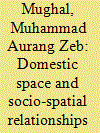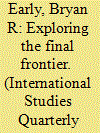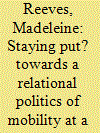| Srl | Item |
| 1 |
ID:
140101


|
|
|
|
|
| Summary/Abstract |
This article explores the changing use and management of domestic space and socio-spatial relationships constructed in a Pakistani rural setting. It offers a case study which highlights the central position of domestic space as a residential and social unit in rural Pakistan. It discusses how domestic space is appropriated in multiple ways into a social unit through social practice. Given that changes in the physical structure of any place lead to negotiation of social relationships, it is shown how recent modifications in design and structure of houses are indicative of, and to some extent facilitate, social change in rural Pakistan.
|
|
|
|
|
|
|
|
|
|
|
|
|
|
|
|
| 2 |
ID:
130998


|
|
|
|
|
| Publication |
2014.
|
| Summary/Abstract |
While space capabilities were once concentrated among a handful of leading powers, an increasingly large number of states have gained access to them. As of 2007, 58 countries possessed dedicated civil space programs, 44 countries had placed nationally owned satellites into orbit, and 9 countries had achieved domestic space launch capabilities. To date, however, no systematic inquiries have ever been conducted into which countries acquire space capabilities and why. Within this paper, I develop an explanatory account that explores the capacity-based factors and political motivations that influence countries' acquisition of space capabilities. I test my hypotheses via a quantitative analysis of the factors affecting 143 countries' acquisition of civil space programs, satellite capabilities, and space launch capabilities from 1950 to 2002. My findings shed new light on the primary causes of the proliferation of civil space capabilities and yield a number of important policy implications
|
|
|
|
|
|
|
|
|
|
|
|
|
|
|
|
| 3 |
ID:
107550


|
|
|
|
|
| Publication |
2011.
|
| Summary/Abstract |
Most research on labour migration from Central Asia has explored the motivations and strategies of those who move. Comparatively less attention has been given to the experience of family members who stay behind. This paper draws on ethnographic research amongst the wives of migrant husbands in a site of gendered out-migration in eastern Uzbekistan to explore diverse experiences of 'staying put'. Whilst spousal absence is experienced by some women as expanding the possibilities for social and spatial mobility, for others it can exacerbate the degree of control exerted by in-laws. Through this ethnography the author argues for a relational politics of mobility: that is, attention to the ways in which the movement of some can constrain (or compel) the mobility of others. Gendered out-migration is both embedded in, and transforms, the domestic organization of honour (nomus), in ways that are socially consequential. In Central Asia, the author argues, a richer understanding of labour migration can be gained by bringing different scales of movement into the same analytical frame and by attending ethnographically to the habitual production of place.
|
|
|
|
|
|
|
|
|
|
|
|
|
|
|
|